Ten Prominent Cardinals from Different Continents Contesting for Papal Legacy
Bellevision Media Network
Vatican City / Italy, 07 Mar 2013: The cardinals Angelo Scola from Italy, Marc Ouellet from Canada, Gianfranco Ravasi from Italy, Christoph Schoenborn from Austria, Odilo Scherer from Brazil, Leonardo Sandri from Argentina, Peter Turkson from Ghana, Luis Tagle from Philippines, Joao Braz de Aviz from Brazil and Timothy Dolan from United States of America are the most influential top clergies contesting for the papal legacy.
Here is a selection of the leading papabili.
Angelo Scola, Italy
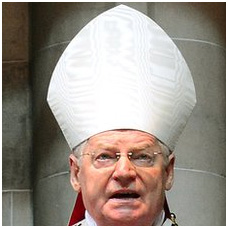
Cardinal Angelo Scola, 71, is the most prominent Italian candidate and has been referred to by one Catholic newspaper as the "crown prince of Catholicism".
A cardinal since 2003, he was appointed Archbishop of Milan in 2011. Cardinal Scola is a conservative, who has been close to both John Paul II and Pope Benedict, both personally and theologically.
In 2010, at the height of sex abuse allegations against the church, he called the media’s attacks on the Pope "an iniquitous humiliation".
Given Pope Benedict’s reasons for resigning, however, it is possible his relatively advanced age may stand against him.
Marc Ouellet, Canada
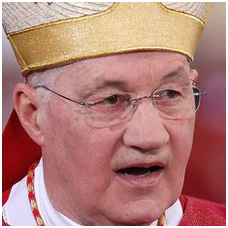
Cardinal Ouellet, 68, from Canada, has headed the Congregation for Bishops since 2010 and has strong Curial connections.
A native French speaker who also speaks fluent Spanish, he has spent much of his life since ordination as a seminary professor and rector, spending 10 years in Colombia and nine in Canada before being appointed to teach at the John Paul II Institute for Marriage and Family in 1997.
A former editor of Communio, an international journal co-founded by Joseph Ratzinger, his thinking is closely linked with that of the resigning Pope. He also has close connections with the Latin American Church.
After a brief stint as vice-president of the Pontifical Council for Promoting Christian Unity, he was named Archbishop of Quebec in 2002 and appointed a cardinal in 2005. Since then, he has stoked controversy by speaking out on moral issues in Canada’s largely secular society.
Gianfranco Ravasi, Italy
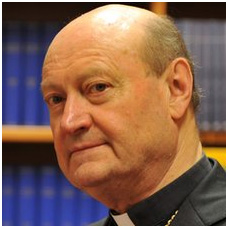
Cardinal Ravasi, 70, has been the president of the Pontifical Council for Culture - or the Vatican’s culture minister - for the past five years and so has strong Curial and academic credentials.
His biblical scholarship has helped him popularize Scripture studies through Italian television, radio and popular magazines.
Some might see this as a disadvantage if electors seek to promote a pastor rather than a professor.
Before he moved to Rome he was a professor and director of the Ambrosian Library in his native Milan - a highly-regarded hub of theological scholarship.
A European intellectual seen as a ‘moderate ecclesiologic¬ally, he is perhaps seen as lacking global experience.
But he was chosen by the Pope to lead the six-day traditional Lenten retreat inside the Apostolic Palace, during which he was scathing about the ‘divisions, dissent, careerism and jealousies’ that afflict Vatican bureaucracy.
Benedict XVI complimented his ‘brilliant’ preaching, sent him a personal thank you letter and invited him for a private audience.
Christoph Schoenborn, Austria
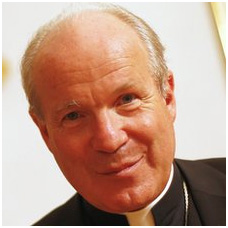
Cardinal Schoenborn, Archbishop of Vienna, is probably the strongest non-Italian candidate from within Europe.
The son of a Bohemian count, he was born in 1945 to a family with a long history of high office in the Catholic church and the Holy Roman Empire.
He was made a cardinal in 1998 and, although seen as intellectually conservative, in 2010 he caused controversy by suggesting it was time to re-examine the issue of priestly celibacy.
Cardinal Schoenborn later issued a clarification, saying he was not "seeking to question the Catholic Church’s celibacy rule".
Odilo Scherer, Brazil
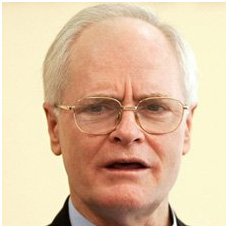
The archbishop of Sao Paulo, Cardinal Odilo Scherer, 63, is the most prominent Latin American candidate.
While head of the largest diocese in the world’s largest Catholic country, Brazil, Cardinal Scherer has also gained considerable Vatican credentials.
He obtained his doctorate in theology from the Pontifical Gregorian University in Rome, and worked at the Congregation for Bishops there.
He has been seen as a compromise candidate who could satisfy both European and Latin American congregations. On the other hand, the 63-year-old German-Brazilian has not been able to reverse a marked downward trend in the number of Catholics in Latin America.
Leonardo Sandri, Argentina
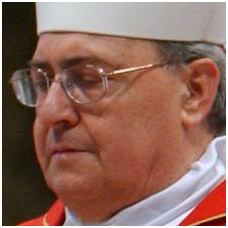
Cardinal Sandri, 63, was born in Buenos Aires in Argentina to Italian parents.
He became a papal diplomat after ordination and served as apostolic nuncio to Venezuela and Mexico. Between 2000 and 2007 he was third-in-command at the Vatican, serving as its chief of staff.
Towards the end of John Paul II’s papacy, he became the ailing pope’s spokesman, and it was Cardinal Sandri who delivered the announcement of the Pope’s death in St Peter’s Square 2005. He now heads the Vatican department for Eastern Churches.
Peter Turkson, Ghana
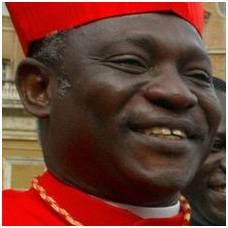
Born in western Ghana in October 1948 to a Methodist mother and a Catholic father, Peter Turkson became the first-ever Ghanaian cardinal in 2003 when he was appointed by Pope John Paul II.
The 64-year-old is the relator, or general secretary, of the Synod for Africa, making him a strong candidate to become the first African pope of the modern age, taking on a mantle that was held during the 2005 Conclave by Nigerian Cardinal Francis Arinze.
The last two Popes both served as relators for a synod of bishops.
Cardinal Turkson is also the head of Vatican’s Council for Justice and Peace, which released a document in 2011 calling for radical economic reforms to deal with the global recession.
The document condemned the "idolatry of the market", and Cardinal Turkson expressed support for the Occupy Wall Street protest movement.
Theologically, he is seen as a moderate, signaling openness, for example, to the argument that condoms might be appropriate for couples where one partner is HIV-positive and the other is not.
In a BBC interview on Monday, Cardinal Turkson side-stepped a question about whether he could be the next pontiff.
Luis Tagle, Philippines
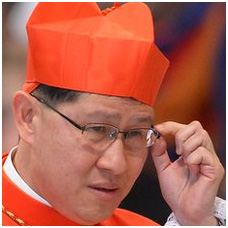
At 55, Luis Tagle is one of the youngest papabili or potential candidates.
He is archbishop of the Philippines’ capital city, Manila - a 2.8 million-strong archdiocese, and he was made a cardinal only a few months ago, in November 2012.
Cardinal Tagle has gained a reputation as a man of the people - as bishop, he is once said to have ridden a cheap bicycle to a run-down neighbourhood in Manila, to deputise for a sick colleague.
He’s also known for inviting beggars outside his cathedral to share a meal with him. Tagle is one of the more media-savvy cardinals. He is a frequent broadcaster in the Philippines and has a presence on Facebook.
Joao Braz de Aviz, Brazil
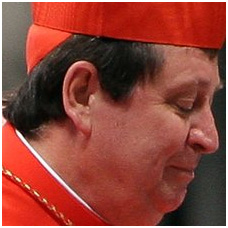
The 65-year-old from Brazil has had his reputation bolstered since taking over as prefect of the Congregation for Institutes of Consecrated Life and Societies of Apostolic Life in 2011.
One of eight children, he was born in Mafra, Santa Catarina, and completed his theological studies at Rome’s Pontifical Gregorian and Pontifical Lateran Universities.
As a young parish priest in Brazil he was caught in the cross-fire of an armed robbery, with bullets perforating his lungs, intestines and an eye: some bullet fragments remain lodged in his body.
Having been made a bishop in 1994 he was appointed archbishop of Brasilia in 2004 and in May 2010 he organised the XVI National Eucharistic Congress to coincide with the 50th anniversary of the city.
He has focused on the welfare of the poor as espoused by the Liberation Theology popular in Latin America. But he distances itself from its ideological ‘excesses’, saying it almost caused him to abandon his vocation.
Timothy Dolan, United States
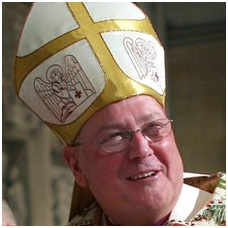
Cardinal Dolan, 62, from the United States, is the archbishop of the influential New York archdiocese.
He has extensive pastoral experience, having headed the Milwaukee diocese before that.
An affable character who has also ably led the US conference of Catholic bishops, he also has strong theological credentials with a PhD in Church History and spent in Rome both as a student and as rector of the North American College.
However, the very fact that he is American may stand in his way - cardinals are generally seen as reluctant to promote figures from a perceived super power state.
There are an estimated 1.2 billion Roman Catholics in the world, according to Vatican figures. More than 40% of the world’s Catholics live in Latin America - but Africa has seen the biggest growth in Catholic congregations in recent years.
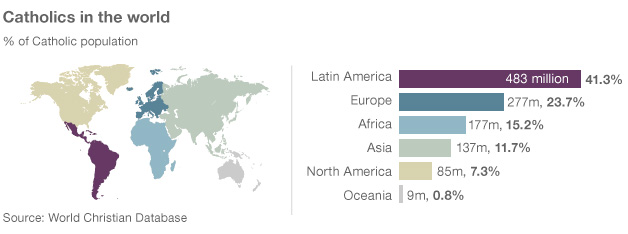
Latin America accounts for 483 million Catholics, or 41.3% of the total Catholic population. Of the 10 countries in the world with the most Catholics, four are in Latin America. Brazil has the highest Catholic population of any country at more than 150 million. Italy has the most Catholics in Europe, with 57 million, while DR Congo has the biggest Catholic population in Africa, ranking ninth in the world with almost 36 million.
Global shift
Since 1970, Catholicism has seen a global shift southwards - the proportion of Catholics living in Europe has declined, while Africa has seen a growth in the number of Catholics - from 45 million in 1970 to 176 million in 2012. Asia has also seen a growth in Catholicism and now represents almost 12% of the total Catholic population in the world, or 137 million people.

Voting cardinals
There are 117 cardinals eligible to take part in the Conclave - the election of the next Pope, but only 115 will take part.
There were 118 at the time of the Pope’s announcement but Cardinal Lubomyr Husar, Archbishop Emeritus of Kiev, turned 80 before the resignation takes effect on 28 February so is excluded from voting.
On 21 February, Cardinal Julius Riyadi Darmaatmadja, the 78 year-old Archbishop Emeritus of Jakarta, ruled himself out of travelling to Rome due to the "progressive deterioration" of his vision.
The resignation of Britain’s most senior Catholic cleric Cardinal Keith O’Brien on 25 February - following allegations he denies of inappropriate behaviour towards priests - also rules him out of the voting, meaning Britain will be unrepresented.
Sixty seven of the cardinal-electors were appointed by Benedict XVI and 60 are European - with 21 of those being Italian.
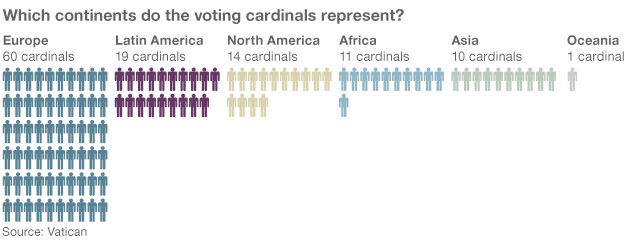
Church law says that anyone baptised a Catholic is eligible to be elected as Pope - but for the past 600 years the new pontiff has always been chosen from among the cardinals. Ten cardinals have been identified as potential frontrunners - including three from Europe, but there is speculation that the new pontiff may come from among the church’s growth areas in Latin America and Africa.
Pope Benedict XVI’s successor will be chosen by 115 cardinal-electors during a secret election - known as a Conclave - in the Vatican’s Sistine Chapel.
Canon Law states that any male who has been baptised is eligible to be elected, but since the late 14th Century the Pope has come from this body of Princes of the Church.
A post once almost exclusively held by Italians has most recently been filled by a Pole and a German, so the race is open, although the composition of the electors offers clues to who might be a frontrunner for the papacy - or papabile.
A two-thirds-plus-one vote majority is required; meaning the man elected is likely to be a compromise candidate. Sixty-seven of the electors were appointed by Benedict XVI, and 50 by his predecessor John Paul II.
About half the cardinal-electors (60) are European - 21 of those being Italian - and many have worked for the administrative body of the Church, the Curia, in Rome.
Thus, a candidate’s credentials will be bolstered if he has Curial experience and affinity with Europe - a working knowledge of Italian is seen as a prerequisite.
But there is also speculation the new pontiff may come from one of the Church’s growth areas – 42 percent of the world’s 1.2 billion Catholics come from Latin America, as do a sixth of the electors.
 Write Comment |
Write Comment |  E-Mail To a Friend |
E-Mail To a Friend |
 Facebook |
Facebook |
 Twitter |
Twitter |
 Print
Print | Comments on this Article | |
| Philip Mudartha, Qatar | Wed, March-6-2013, 11:00 |
| Comprehensive compilation, essential read, especially for laity Catholics and general population. Edited right. Popular belief is Catholicism is fading and is passe. Hardly. In fact, Catholics today are more tolerant of dissent among themselves than their other churches. This tolerance of free to do what an individual thinks is right for him is a prominent discussion. Our Bishops attended meetings of their Synod during the Year of Faith-2012. If only they would write and publish the range of views and emotions in the meetings. Even though the conclusions are known, and are leaning towards traditional positions of church doctrine on theological, social, cultural and political facets of human life, we do not have the annual papal Encyclical yet. In this environment, the papabili may be disappointed, as in four previous conclaves in fifty years. | |



















